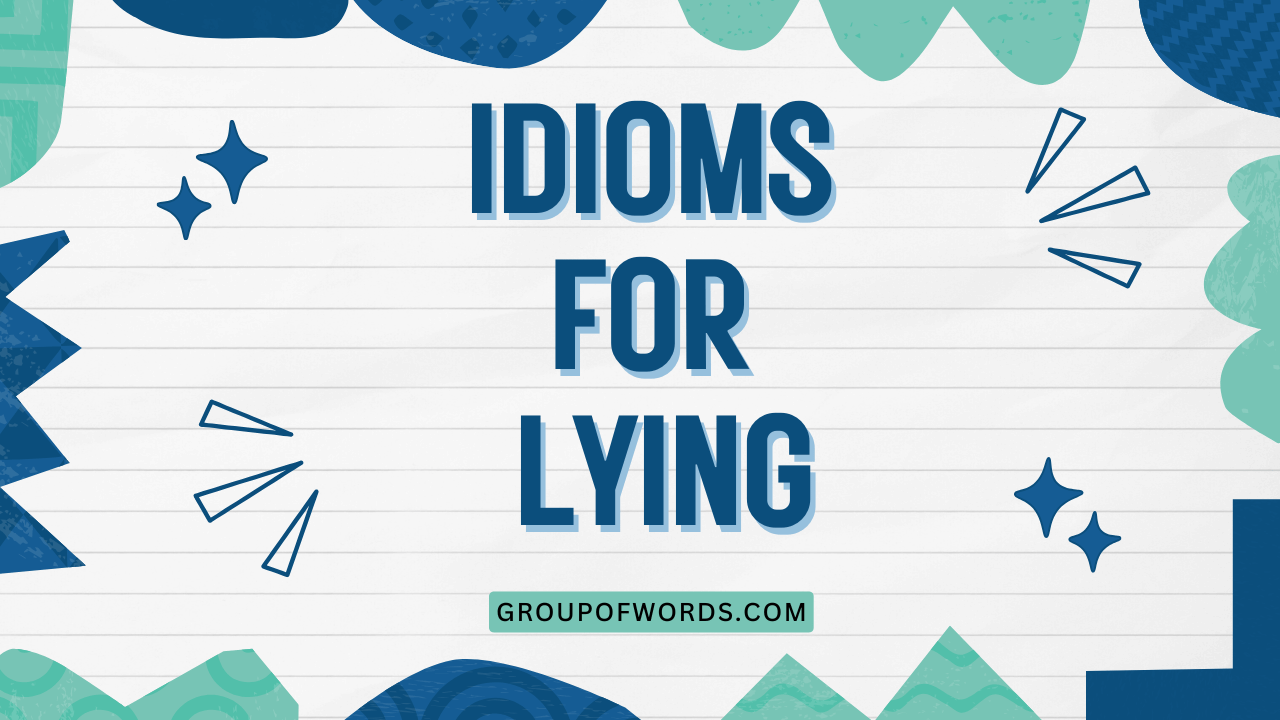Unmasking Deception: A Guide to English Idioms for Lying
Understanding idioms is crucial for mastering the nuances of the English language. When it comes to discussing deception, English offers a rich array of idioms that go beyond simple vocabulary.
This article explores common idioms used to describe lying, their meanings, and how to use them correctly. Whether you’re an English language learner or a native speaker aiming to refine your communication skills, this guide will help you navigate the world of deceitful expressions with confidence.
Table of Contents
- Introduction
- Definition of Idioms for Lying
- Structural Breakdown of Lying Idioms
- Types of Lying Idioms
- Examples of Idioms for Lying
- Usage Rules for Lying Idioms
- Common Mistakes When Using Lying Idioms
- Practice Exercises
- Advanced Topics in Lying Idioms
- Frequently Asked Questions
- Conclusion
Definition of Idioms for Lying
Idioms are expressions whose meanings cannot be understood from the literal definitions of the individual words. Idioms for lying are specific phrases used to describe the act of not telling the truth, often adding color and nuance to the description.
These idioms can range from gentle euphemisms to harsh accusations, depending on the context and the speaker’s intent. They are classified as fixed expressions, meaning their form usually cannot be altered without losing their idiomatic meaning.
The function of these idioms is to convey deception in a creative and indirect way, making language more engaging and expressive.
The contexts in which lying idioms are used vary widely. They appear in everyday conversations, literature, movies, and news reports.
Understanding these idioms is essential for comprehending the full meaning of a message and for communicating effectively in English. Recognizing when someone is using an idiom for lying can also help you discern the speaker’s attitude towards the deception being discussed.
This is especially important in situations where direct accusations might be impolite or inappropriate.
Structural Breakdown of Lying Idioms
Lying idioms can vary significantly in their structure. Some are simple phrases consisting of a verb and a noun (e.g., “stretch the truth”), while others are more complex clauses (e.g., “have your fingers crossed”). Many involve figurative language, such as metaphors (e.g., “spin a yarn”) or similes (e.g., “as crooked as a dog’s hind leg”). The structural elements often contribute to the idiom’s overall impact and memorability.
The patterns within these idioms often rely on specific word choices that create a sense of deception or dishonesty. For instance, words like “white” (in “white lie”), “fishy,” or “crooked” frequently appear.
Understanding these patterns can help you identify and interpret new lying idioms you encounter. The grammatical rules governing these idioms are generally the same as for standard English, but the idiomatic meaning overrides the literal interpretation of the sentence.
Types of Lying Idioms
Lying idioms can be categorized based on the type of deception they describe. Understanding these categories can help you choose the most appropriate idiom for a given situation.
Exaggerations
Exaggerations involve stretching the truth to make something seem more impressive or significant than it actually is. These idioms often imply a degree of harmlessness or humor.
Omissions
Omissions refer to leaving out important details to create a false impression. This type of lying is often more subtle but can be just as deceptive as outright fabrication.
Fabrications
Fabrications are complete lies that involve inventing information or events. These idioms typically carry a stronger negative connotation.
Misleading Statements
Misleading statements involve saying something that is technically true but designed to deceive the listener. These idioms highlight the speaker’s intent to mislead rather than the outright falsity of the statement.
Examples of Idioms for Lying
The following sections provide examples of idioms for lying, categorized by the type of deception they represent. Each category includes a table with numerous examples, their meanings, and illustrative sentences.
Examples of Exaggerations
These idioms describe instances where the truth is stretched to make something seem more impressive or significant.
The table below presents several idioms related to exaggerations, along with their meanings and example sentences. Understanding these nuances can help you better express yourself and interpret others’ statements.
| Idiom | Meaning | Example Sentence |
|---|---|---|
| Stretch the truth | Exaggerate or distort the facts. | He tended to stretch the truth when talking about his accomplishments. |
| Embellish a story | Add details to make a story more interesting, often exaggerating. | She would always embellish a story to make it more exciting for the children. |
| Overstate the case | Describe something in exaggerated terms. | The salesperson overstated the case to convince me to buy the product. |
| Pile it on | Exaggerate or add to something, often unnecessarily. | He was really piling it on when he described how difficult the project was. |
| Lay it on thick | Exaggerate or flatter excessively. | She was laying it on thick with the compliments, hoping to get a raise. |
| Blow something out of proportion | Treat something as more serious than it is. | The media blew the incident out of proportion, creating unnecessary panic. |
| Make a mountain out of a molehill | Exaggerate the importance of something trivial. | Don’t make a mountain out of a molehill; it’s just a small mistake. |
| Tell a tall tale | Tell an exaggerated or unbelievable story. | The old sailor loved to tell tall tales about his adventures at sea. |
| Paint a rosy picture | Present a situation as better than it actually is. | The company painted a rosy picture of their financial situation to attract investors. |
| Magnify the importance | Increase the perceived importance of something. | He tended to magnify the importance of his role in the project. |
| Dramatize the situation | Present a situation in a dramatic or exaggerated way. | She always dramatizes the situation to get attention. |
| Put a spin on it | Present something in a particular way, often to make it seem better. | The politician tried to put a spin on the scandal to minimize the damage. |
| Color the truth | Present the truth in a way that is biased or misleading. | He always colors the truth to make himself look good. |
| Pad the numbers | Inflate figures or statistics. | They were accused of padding the numbers to meet their sales targets. |
| Build castles in the air | Make plans that are unrealistic or unlikely to happen. | They were just building castles in the air with their extravagant plans. |
| Go overboard | Do something to an excessive degree. | He really went overboard with the decorations for the party. |
| Exaggerate wildly | Exaggerate in an uncontrolled or extreme manner. | She tends to exaggerate wildly when she talks about her travels. |
| Aggrandize oneself | Enhance one’s own importance or reputation. | He always tries to aggrandize himself in front of his colleagues. |
| Over-egg the pudding | Spoil something by trying too hard to improve it. | He over-egged the pudding by adding too many details to the story. |
| Lay it on with a trowel | Exaggerate or flatter excessively and obviously. | She was laying it on with a trowel when she praised his performance. |
| Pile on the superlatives | Use many exaggerated adjectives to describe something. | He was piling on the superlatives to make the product sound irresistible. |
| Stretch the imagination | Exaggerate to the point where it is hard to believe. | His claims were really stretching the imagination. |
Examples of Omissions
These idioms describe instances where important details are left out to create a false impression.
The table below showcases several idioms related to omissions, clarifying their meanings and providing example sentences for better understanding.
| Idiom | Meaning | Example Sentence |
|---|---|---|
| Leave something out | Intentionally omit information. | He left out the part about crashing the car when he told his parents. |
| Hold back information | Deliberately not reveal certain facts. | She was holding back information that could have helped the investigation. |
| Keep mum | Remain silent about something. | They decided to keep mum about their plans to surprise her. |
| Play it close to the vest | Keep one’s plans or intentions secret. | He played it close to the vest, not revealing his strategy to anyone. |
| Beat around the bush | Avoid getting to the point. | Stop beating around the bush and tell me what you really want. |
| Skirt the issue | Avoid dealing directly with a question or problem. | The politician skirted the issue during the press conference. |
| Not breathe a word | Keep something a secret. | I promised I wouldn’t breathe a word about their engagement. |
| Keep something under wraps | Keep something secret or hidden. | The company is keeping the new product under wraps until the launch date. |
| Sit on information | Deliberately delay revealing information. | He was accused of sitting on information that could have prevented the accident. |
| Filter information | Selectively present information. | They filter information to make their company look better. |
| Hide the truth | Conceal the actual facts. | He tried to hide the truth about his whereabouts last night. |
| Withhold details | Refrain from providing complete information. | She chose to withhold details to avoid causing panic. |
| Omit crucial facts | Leave out information that is essential to understanding. | They omitted crucial facts in their report, making it misleading. |
| Cover up | Attempt to prevent people from discovering something. | The government tried to cover up the scandal. |
| Keep a lid on it | Suppress or keep something secret. | They’re trying to keep a lid on the rumors. |
| Say nothing | Remain silent, especially when expected to speak. | He chose to say nothing when asked about the incident. |
| Clam up | Become silent suddenly, especially when nervous or uncomfortable. | He clammed up as soon as the police arrived. |
| Mum’s the word | Keep silent about something. | Mum’s the word about the surprise party! |
| Hold one’s tongue | Refrain from speaking. | I had to hold my tongue to avoid arguing with him. |
| Bury one’s head in the sand | Ignore a problem or unpleasant situation. | You can’t just bury your head in the sand and hope the problem goes away. |
| Soft-pedal the truth | Downplay or minimize the truth. | They tried to soft-pedal the truth to avoid alarming the public. |
| Underreport the facts | Report less than the actual amount or truth. | The company was accused of underreporting the facts to avoid taxes. |
Examples of Fabrications
These idioms describe instances of complete lies that involve inventing information or events.
The table below provides examples of idioms related to fabrications, detailing their meanings and providing example sentences for effective understanding and usage.
| Idiom | Meaning | Example Sentence |
|---|---|---|
| Tell a lie | Make a false statement with the intention to deceive. | He told a lie about where he was last night. |
| Make something up | Invent a story or excuse. | She made up an elaborate story to explain her absence. |
| Spin a yarn | Tell a long, often exaggerated story. | The old man loved to spin a yarn about his adventures. |
| Cook up a story | Invent a false story. | He had to cook up a story to explain why he was late. |
| Pull the wool over someone’s eyes | Deceive someone. | He tried to pull the wool over my eyes, but I saw through his lies. |
| Fabricate evidence | Invent false evidence to support a claim. | They were accused of fabricating evidence to frame him. |
| Trump up charges | Invent false charges against someone. | The corrupt official trumped up charges against his rival. |
| Bear false witness | Give false testimony. | He was warned that he would be punished if he bore false witness. |
| Concoct a story | Invent a complicated story. | She concocted a story to explain the missing money. |
| Invent out of thin air | Create something from nothing. | He seemed to invent the entire excuse out of thin air. |
| Lie through one’s teeth | Tell a blatant lie without hesitation. | He was lying through his teeth when he said he didn’t know anything about it. |
| Make a false statement | Provide information that is not true. | She made a false statement to the police. |
| Prevaricate | Speak or act in an evasive way. | The politician was known to prevaricate when asked difficult questions. |
| Perjure oneself | Willfully tell an untruth under oath. | He perjured himself during the trial. |
| Give a false account | Provide an untrue explanation or description. | She gave a false account of what happened at the party. |
| Tell a porky | Tell a lie (British slang). | He told a porky about why he was late for work. |
| Fudge the facts | Present facts in a vague or misleading way. | They fudged the facts to avoid admitting their mistake. |
| Falsify records | Alter records to mislead. | The accountant was caught falsifying records to hide the embezzlement. |
| Cook the books | Falsify financial records. | The company was accused of cooking the books to inflate their profits. |
| Pass off a forgery | Present a fake item as genuine. | He tried to pass off a forgery as an original painting. |
| Misrepresent the truth | Give a false or misleading account of the facts. | They misrepresented the truth to protect their reputation. |
| Spread disinformation | Deliberately spread false information. | The government was accused of spreading disinformation to manipulate public opinion. |
Examples of Misleading Statements
These idioms describe instances where statements are technically true but designed to deceive the listener.
The table below contains idioms related to misleading statements, along with their meanings and example sentences to enhance your understanding and usage.
| Idiom | Meaning | Example Sentence |
|---|---|---|
| Evasive answer | An answer that avoids the question. | He gave an evasive answer when asked about his involvement. |
| Half-truth | A statement that is only partially true. | What he said was a half-truth, designed to mislead us. |
| Play with words | Manipulate language to deceive. | The lawyer played with words to confuse the jury. |
| Be economical with the truth | Not tell the whole truth to avoid causing problems. | She was being economical with the truth to protect her friend. |
| Give a song and dance | Provide an elaborate, often misleading explanation. | He gave us a song and dance about why he was late. |
| Split hairs | Argue about trivial or semantic differences. | They were just splitting hairs over the meaning of the contract. |
| Dance around the issue | Avoid addressing a topic directly. | The politician kept dancing around the issue during the interview. |
| Be vague | Not providing clear or precise details. | He was deliberately being vague about his plans. |
| Cloud the issue | Make an issue less clear. | The additional details only served to cloud the issue. |
| Obfuscate the truth | Make the truth unclear or obscure. | The company tried to obfuscate the truth about the accident. |
| Mislead someone | Cause someone to have a wrong idea or impression. | He misled me into thinking he was the manager. |
| Be deceptive | Give a misleading impression. | His calm demeanor was deceptive; he was actually very angry. |
| Throw someone off the scent | Deliberately mislead someone. | He tried to throw the police off the scent by giving a false alibi. |
| Hide behind semantics | Use the exact meaning of words to avoid the real issue. | The politician tried to hide behind semantics to justify his actions. |
| Create a smokescreen | Do something to conceal your real intentions or activities. | The announcement was just a smokescreen to distract from the real problem. |
| Use doublespeak | Use ambiguous language to conceal the truth. | The government often uses doublespeak to avoid admitting mistakes. |
| Be economical with the actualité | Be careful with how you present facts, often to mislead. | He was economical with the actualité when discussing the project’s failures. |
| Circumlocute | Speak evasively. | He tended to circumlocute when asked direct questions. |
| Be slippery | Difficult to pin down or get a straight answer from. | He’s a slippery character; you can never trust what he says. |
| Equivocate | Use ambiguous language to conceal the truth or avoid committing to a particular point of view. | The politician was accused of equivocating on the issue. |
Usage Rules for Lying Idioms
Using lying idioms correctly requires understanding their specific meanings and contexts. It’s important to consider the tone and formality of the situation. Some idioms are more appropriate for casual conversation, while others are suitable for formal writing or speech. For example, “telling a porky” is British slang and wouldn’t be appropriate in a formal setting. Pay attention to the nuances of each idiom to ensure you’re conveying the intended message accurately.
Also, be mindful of the potential impact of your words. Accusing someone of lying can be a serious matter, so choose your idioms carefully. Using a milder idiom like “stretching the truth” might be more appropriate than a harsher one like “lying through your teeth,” depending on the situation and your relationship with the person you’re addressing. Context is key when using idioms, as their meaning can change depending on how they are used in a sentence.
Common Mistakes When Using Lying Idioms
One common mistake is misinterpreting the meaning of an idiom. For example, someone might think “beating around the bush” means physically hitting something, rather than avoiding the main point. Another mistake is using an idiom in the wrong context. For instance, using “pulling someone’s leg” (meaning to tease or joke) when you actually mean to accuse someone of serious deception would be inappropriate. Additionally, many learners misuse the individual words within the idiom, altering the fixed expression and losing the idiomatic meaning.
Here are some examples of common mistakes and their corrections:
| Incorrect | Correct | Explanation |
|---|---|---|
| He was rolling the wool over my eyes. | He was pulling the wool over my eyes. | The correct idiom is “pull the wool over someone’s eyes,” not “roll.” |
| Stop hitting around the bush. | Stop beating around the bush. | The correct idiom is “beating around the bush,” not “hitting.” |
| She told a high story. | She told a tall tale. | The correct idiom is “tall tale,” not “high story.” |
| He is being economic with the true. | He is being economical with the truth. | The correct phrase is “economical with the truth,” not “true.” |
| They were cooking the magazines. | They were cooking the books. | The correct idiom is “cooking the books” for financial records, not “magazines.” |
Practice Exercises
Test your understanding of idioms for lying with these practice exercises. Choose the correct idiom to complete each sentence.
Exercise 1: Multiple Choice
| Question | Options | Answer |
|---|---|---|
| 1. He was ______ about his past, making it difficult to trust him. | a) splitting hairs, b) beating around the bush, c) telling a tall tale | b) beating around the bush |
| 2. The company was accused of ______ to hide their financial losses. | a) cooking the books, b) stretching the truth, c) keeping mum | a) cooking the books |
| 3. She ______ when asked about her whereabouts last night. | a) lied through her teeth, b) embellished a story, c) held back information | a) lied through her teeth |
| 4. He tried to ______ by giving a false alibi to the police. | a) throw them off the scent, b) overstate the case, c) leave something out | a) throw them off the scent |
| 5. They were ______ to attract more investors. | a) painting a rosy picture, b) keeping a lid on it, c) skirting the issue | a) painting a rosy picture |
| 6. Stop ______, just tell me what you really want! | a) exaggerating wildly, b) beating around the bush, c) falsifying records | b) beating around the bush |
| 7. He always ______ to make himself look better. | a) colors the truth, b) keeps mum, c) leaves something out | a) colors the truth |
| 8. She ______ when she said she didn’t know anything about the missing documents. | a) played it close to the vest, b) lied through her teeth, c) held her tongue | b) lied through her teeth |
| 9. The politician ______ during the press conference. | a) skirted the issue, b) made something up, c) pulled the wool over our eyes | a) skirted the issue |
| 10. They are trying to ______ about the new product until the launch date. | a) keep it under wraps, b) pile it on, c) build castles in the air | a) keep it under wraps |
Exercise 2: Fill in the Blanks
Complete the following sentences using appropriate idioms for lying.
- He ___________ about his experience to get the job. (stretched the truth)
- They tried to ___________ about the scandal to protect their reputation. (cover up)
- She always ___________ to get attention. (dramatizes the situation)
- The company was caught ___________ to inflate their profits. (cooking the books)
- He ___________ when asked about his involvement in the crime. (gave an evasive answer)
- They decided to ___________ about their plans to surprise her. (keep mum)
- She ___________ to explain her absence. (made up an elaborate story)
- The politician kept ___________ during the interview. (dancing around the issue)
- They are trying to ___________ about the rumors. (keep a lid on)
- He was warned that he would be punished if he ___________ . (bore false witness)
Advanced Topics in Lying Idioms
For advanced learners, exploring the etymology and historical context of lying idioms can provide a deeper understanding of their meanings and usage. For example, the idiom “pull the wool over someone’s eyes” originates from a time when people wore wigs, and tricksters would literally pull the wig over someone’s eyes to deceive them. Understanding the origins of idioms can make them easier to remember and use correctly. Analyzing how these idioms are used in literature and media can also enhance your comprehension and appreciation of the English language.
Another advanced topic is the cultural variations in lying idioms. While some idioms are universally understood, others are specific to certain regions or dialects. For instance, “telling a porky” is a British expression that might not be familiar to speakers of American English. Being aware of these cultural differences can help you avoid misunderstandings and communicate effectively in diverse contexts. Exploring the psychological aspects of lying and how they are reflected in language can also provide valuable insights into human behavior and communication.
Frequently Asked Questions
- What is the difference between an idiom and a saying?
An idiom is a phrase whose meaning is not predictable from the usual meanings of its constituent elements (e.g., “kick the bucket”). A saying, on the other hand, is a well-known statement that expresses a general truth or piece of advice (e.g., “honesty is the best policy”).
- How can I improve my understanding of idioms for lying?
Read widely, listen to native speakers, and pay attention to the context in which idioms are used. Use flashcards or language learning apps to memorize common idioms and their meanings. Practice using idioms in your own writing and speaking to reinforce your understanding.
- Are there any idioms for lying that are considered offensive?
Yes, some idioms can be offensive depending on the context and the speaker’s intent. For example, accusing someone of “lying through their teeth” can be considered harsh and confrontational. Be mindful of the potential impact of your words and choose your idioms carefully.
- How do I know when someone is using an idiom for lying?
Pay attention to the context and the speaker’s tone. If a phrase doesn’t make sense when interpreted literally, it’s likely an idiom. Look for clues in the surrounding conversation that might indicate deception or dishonesty.
- Can idioms for lying be translated directly into other languages?
No, idioms rarely translate directly because their meanings are culturally specific. A direct translation would likely not make sense in another language. It’s better to find an equivalent idiom in the target language that conveys a similar meaning.
- Is it appropriate to use idioms for lying in formal writing?
It depends on the specific idiom and the tone of your writing. Some idioms are too informal for formal contexts, while others can add color and nuance to your writing. Use your judgment and consider your audience when deciding whether to use an idiom.
- Why is it important to learn idioms for lying?
Understanding idioms for lying is crucial for comprehending the nuances of the English language and for communicating effectively. It allows you to recognize deception, express yourself more creatively, and navigate social situations with confidence.
- Are there regional differences in the use of idioms for lying?
Yes, some idioms are more common in certain regions or dialects than others. For example, “telling a porky” is primarily used in British English. Be aware of these regional differences to avoid misunderstandings and communicate effectively in diverse contexts.
Conclusion
Mastering idioms for lying is an essential step towards achieving fluency in English. These colorful expressions provide a deeper understanding of how deception is perceived and discussed in the English-speaking world.
By understanding the various types of lying idioms, their usage rules, and common mistakes to avoid, you can improve your comprehension skills and communicate more effectively. Remember to practice using these idioms in your own speech and writing to reinforce your learning.
Continue to explore the rich tapestry of English idioms and expand your vocabulary. Pay attention to the context in which idioms are used and be mindful of their potential impact.
With consistent effort and practice, you’ll be able to navigate the world of deceitful expressions with confidence and skill. Keep practicing and don’t be afraid to use these idioms in your everyday conversations.
The more you practice, the more natural they will become.






